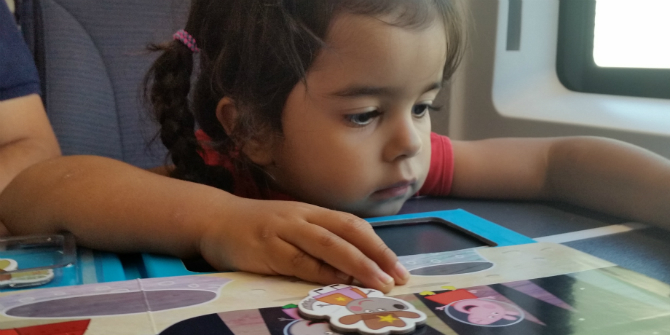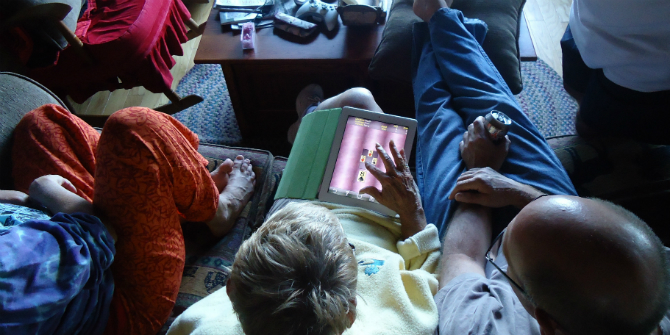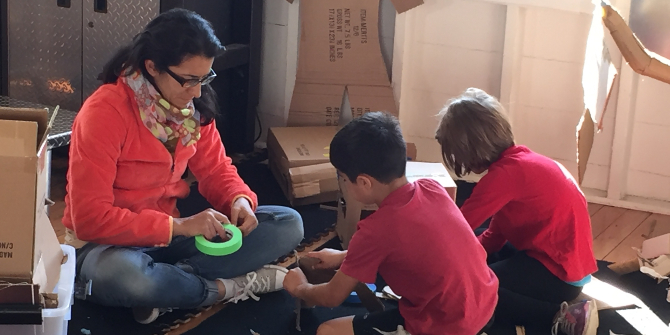 While teens in the UK and US seem to be losing interest in Facebook, its popularity in Mexico remains unrivalled. Zorana Milićević looks at how children and parents use Facebook to ‘get on’ in life and to create meaningful relationships. Zorana is a freelance writer and researcher. She spent 12 months in rural Mexico conducting ethnographic fieldwork with children, their parents and teachers.
While teens in the UK and US seem to be losing interest in Facebook, its popularity in Mexico remains unrivalled. Zorana Milićević looks at how children and parents use Facebook to ‘get on’ in life and to create meaningful relationships. Zorana is a freelance writer and researcher. She spent 12 months in rural Mexico conducting ethnographic fieldwork with children, their parents and teachers.
Research about the efforts parents make to control their children’s use of digital media suggests that many adults clearly distinguish between the online activities that enhance learning, foster personal development and contribute to young people’s future opportunities, and those that distract them from pursuing their goals. Children’s engagement on Facebook is readily recognised as an illustrative example of the latter, with parents’ anxieties reinforced by headlines about Facebook being ‘the world’s biggest waste of time’ or ‘a whole new world of wasting time’.
I conducted research in Metztitlán, Mexico, where many parents shared these ideas . Yet accounts of those who challenged them reveal how parents’ attitudes towards children’s online behaviour may be affected by their perceptions of the opportunities provided through the local environment. While most of Metztitlán’s 3,125 inhabitants depend either directly or indirectly on agriculture for their livelihood, villagers often dream of their children earning university degrees and building successful careers unrelated to agriculture.
I observed how parents advised their children that in order to ‘succeed in life’ they should work hard and stay focused, but they did not hesitate to stress how much professional development depended on ‘knowing the right people’. Rodrigo, father of two primary school-aged boys, told me:
Some people say connections matter just here in Mexico and countries like Mexico. They think in places like the US it’s all about merit and hard work. Well, let me tell you one thing. I’ve been to the US and I’ve seen that connections matter there, too. Perhaps not to the same extent, but knowing the right people matters everywhere.
Similarly to most of the villagers I spoke to, Rodrigo believed that the village could not provide his sons with sufficient opportunities to forge relationships with the ‘right people’.
Meeting the ‘right people’ through Facebook
While Rodrigo hoped that sending his children to study in Pachuca or Mexico City might expand their possibilities, his neighbour Maritza was convinced that her teenage daughter’s future career could benefit from access to Facebook. She saw it as “a window onto the world” that allowed her daughter to keep in touch with the young people who had left the village and to meet new friends:
She wants to be a lawyer. Lawyers need many contacts. You never know who and when will be able to give you a hand in life. If you just count on the people from your own village, you won’t get very far.
Isabel could not afford to buy her son a computer or a smartphone, but she encouraged him to use the internet at school, at an internet café, or at a neighbour’s home. She believed that he could not aspire to, as she put it, “a serious job” in the future if he was unable to master new technologies:
When you live in Los Angeles or New York, you can meet so many new people every day and you never know where you can find friendship, love, perhaps a job, a scholarship. It’s different in the village; it’s always the same people. With Facebook, your world changes, it’s not the same old faces every day.
Excitement about the opportunities that some parents recognised in the use of social networks did not obscure their awareness of the risks of children making contacts through the internet. Many warned their children not to accept friend requests from people they did not know. “My husband’s cousin lives in the US and my daughter’s in contact with his daughters through Facebook. If she accepts requests from her cousins’ friends from the US, that’s fine with me. I don’t let her contact total strangers,” Maritza clarified.
Victoria set up a Facebook account in order to “have some fun and pick up gossip”, but she admitted that she also used her profile to keep an eye on her children’s activities. Her concerns about her children’s online safety seemed to be alleviated by the conviction that “they already know” that they have to be careful with strangers. “I taught that to them long before Facebook,” she remarked, concluding:
I love my village but I want my children to travel, to see the world, to have a great job, to have a better life than me. You need to know the right people to achieve all that. There are 3,000 people in our village and millions of people on Facebook. You do the maths!
Doing the maths of social networking
Little is known about how likely young people are to build lasting relationships or to establish professional collaboration with those they meet online. While the appeal of big numbers may be hard to resist, doing the maths is not so straightforward. Information about the ways girls and boys commonly interact on social networks indicates that contacts made through Facebook hardly make up for the lack of sufficiently promising networking opportunities in their offline environment. No matter how assuring the notification that ‘X and Y are friends now’ may sound, the transformation of strangers into friends, partners or collaborators beyond the virtual world is undoubtedly a complex process that usually requires time, dedication and good will, but above all, a great deal of luck.
While teens in the UK and US seem to be losing interest in Facebook, its popularity among the Mexican internet population of all ages remains unrivalled. According to CNN, in 2014, Facebook reached 51 million registered users in Mexico, which amounts to an astounding 99.6% of Mexican internet users, over a third of whom are under 19.
Many teachers and other experts in education note that the popularity of social networking sites among young people should not be ignored, and that Facebook can be used for a wide range of classroom activities, such as presenting projects and organising school trips and events. Setting up collaborative projects through Facebook groups between classes from small rural communities and their peers from other parts of the country or from abroad provides opportunities to engage with new contacts in creative and stimulating ways that might allow children to develop more solid and meaningful relationships than is the case with random online encounters.






